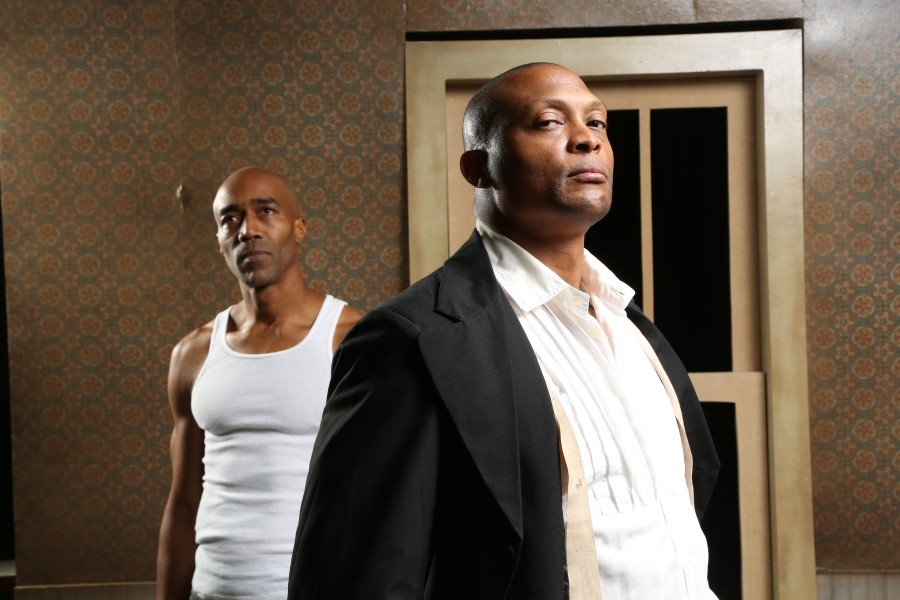Heisman-winning running back Eddie George has a busy post-NFL career as a stage actor, including a 2016 turn as Billy Flynn in Chicago on Broadway and a series of roles in his hometown of Nashville. His newest is Suzan-Lori Parks’s Topdog/Underdog at Nashville Repertory Theatre, Feb. 9-23.
EVANS DONNELL: You played Booth in the 2010 production of Topdog/Underdog at Nashville’s Amun Ra Theatre, opposite your friend and mentor jeff obafemi carr. What’s it like to revisit the play now, in the role of Lincoln, the older brother, opposite Joel Diggs as Booth?
EDDIE GEORGE: It’s like revisiting an old friend from a different perspective. I’m not coming to it from a sense of newness. I have some experience under my belt now. I feel I’ve matured as a man to bring something different to the character. This was a play that I had my eyes on. Once I got into more theatrical pieces, I definitely wanted to redo it and try Lincoln. It’s a piece which requires you to rely on your past and to play the subtleties of a human being and show the different sides of him and the torment that he suffers from a quiet place.
Suzan-Lori Parks has said her play is about “what it means to be family. And then in the biggest sense, the family of man. What it means to be connected with somebody else…[and] who the world thinks you’re going to be and how you struggle with that.” Are those themes in your mind as you perform the piece?
First and foremost, I go back to what the script says about Lincoln, what the other characters say about him, what he says about himself. It’s truly a story of perseverance, and one where you’re really trying to become something different, aspire to be something different. Then, when you’re slapped down with adversity, how do you handle that monster? And does it crush your dreams to the point where you don’t want to function anymore?
Topdog/Underdog is a pretty grueling two-hander, and your Othello for Nashville Shakespeare Festival certainly required a great deal of energy. How much does your athletic and fitness background aid you in performing such roles night after night?
Man, that’s a great question. It helps me out tremendously, because you must have the stamina. It takes a lot out of your body. You use your body, your spirit, your entire being to allow that energy to come out, and you’re exhausted by the end of the play if you are willing to go places it requires you to go.
So yes, having the experience of playing [football] and understanding that there’s four quarters to every game and not to go all out in the first half and have nothing left, having no place to go—it’s just understanding the beginning, middle, end, and allowing it to build, and to show bits and pieces, just windows, small windows of where the character is headed and what he has inside of him. And allowing that to breathe, if that makes sense. My athletic background plays a huge part in that.
You’ve done a wide range of roles in the last decade plus, from Shakespearean tragedies and classical and contemporary American plays to your Broadway turn in the musical Chicago. Has that wide range been by design?
No! [Laughs] I wish I could take credit. I just go from one opportunity to the next based on what speaks to my spirit that particular season. I tend to gravitate toward roles that kind of scare me, that’ll push me both as a person and as an actor, that force me to stretch and really hone my acting chops.
As I recall, you took Saturday classes at the New Freedom Theatre in Philadelphia as a kid. Was that where the acting seed was planted? And how does that early training influence you now?
It was something I didn’t embrace then. I wanted to be in the streets. I wanted to play football. I wanted to ride my bike. I wanted to play basketball. I didn’t want to be in a theatre on an early Saturday morning. And I had no idea that I would get into it. I give all the credit to my mother for pushing me in that avenue. It was by no means something I wanted to do, but she put me in that environment, so if that ever came up again, I could rely on that and say, “Hey, this is something I love to do.”
One of your earliest roles was in the film The Game Plan. What’s your game plan for the future when it comes to acting?
To be open to all the possibilities. The No. 1 thing is to be a service and to bring a light or awareness to a situation or bring healing to someone, because the arts are meant to heal and to inspire people to think beyond what they think are their limitations. The beautiful thing about acting is you can be anything you want to be.


